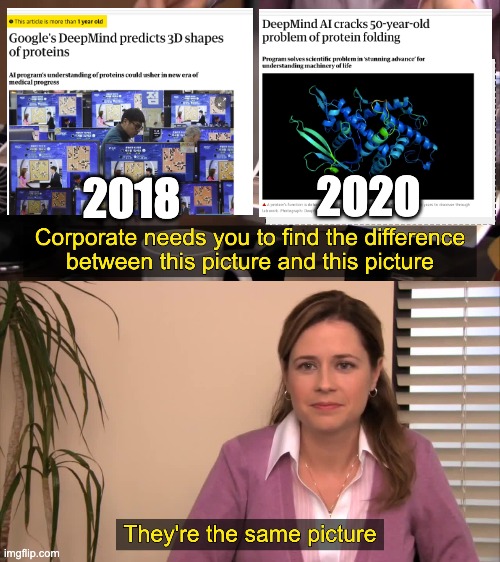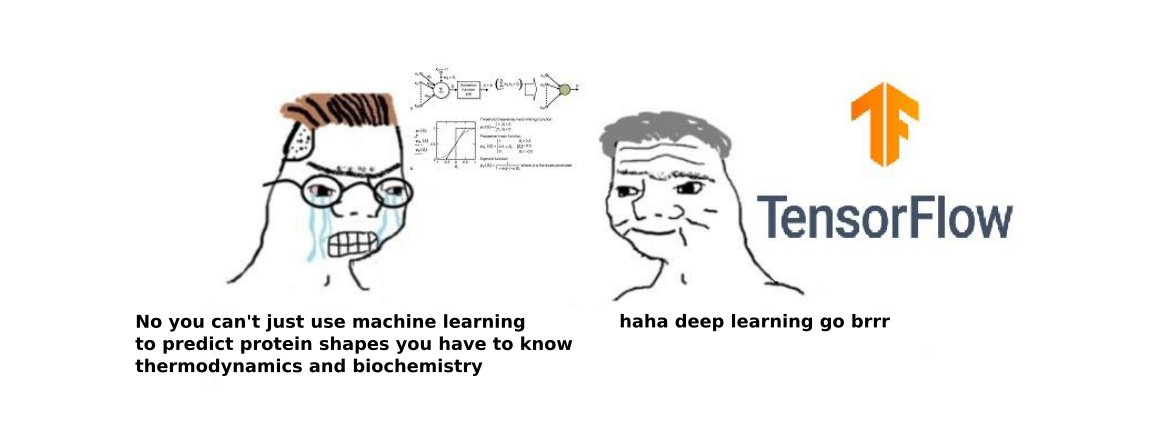Thread time!
"Google DeepMind's AI will change everything you know about biology and protein structures". Fact or fiction?
"Google DeepMind's AI will change everything you know about biology and protein structures". Fact or fiction?
2018: DeepMind's latest AI program, AlphaFold, beats everyone at a very niche competition: predicting the 3D shapes of proteins straight from their amino acid sequence. https://www.theguardian.com/science/2018/dec/02/google-deepminds-ai-program-alphafold-predicts-3d-shapes-of-proteins
2020: AlphaFold beats everyone at the same competition.. again. Why is this news? https://www.nature.com/articles/d41586-020-03348-4
It's not like the DeepMind folks looked at 2020 and said "eh, there's nothing happening this year, let's just go on the news and say we're changing the world AGAIN". To be fair, they did have some nice news! They had won the competition... with a much higher score this time 

And why is that news? Here's some context: being able to predict the 3D shape of a protein is important because the function of a drug or enzyme depends on the shape of the molecule (i.e. the protein). But it's very difficult to predict shape just from the amino acid sequence.
So here comes CASP (Critical Assessment of Structure Prediction). It's a yearly competition to see who's best at predicting protein shapes. Several research groups submit their algorithms, and there's a scoreboard, an answer sheet and all that. And DeepMind won the competition!
AND they won it with a very high score. In theory, that means their algorithms are good enough to be used in real life, in drug design, synthetic biology, personalised medicine, you name it.
But remember: having an algorithm that predicts protein folding is vastly different from understanding protein folding.
In physics, for example, we are used to ultra-simplified mathematical models, but that help us understand nature. Physicists joke about spherical cows in a frictionless vacuum -- that's because their aim is not to make precise predictions, but to... understand the world.
In computer science, lately we've seen a lot of the opposite: prediction comes first, even if at the cost of understanding the microscopic details of a system. That's how you end up with a lot of "black boxes": ML models that work, but no one knows why.
And are these black-box models BAD? Not necessarily. It depends on the context. If you're using a machine learning model in a courtroom or in a bank, you want transparency and accountability, but if you're predicting protein shapes to make a new drug.. maybe it's less important?
Well, that's debatable (and worth debating).
But it's clear that better prediction doesn't necessarily lead to better understanding. So what's the verdict then? Is DeepMind going to change everything in biology or not?
But it's clear that better prediction doesn't necessarily lead to better understanding. So what's the verdict then? Is DeepMind going to change everything in biology or not?
Well... maybe! It depends on whether we can "reverse engineer" AlphaFold 2 to understand what were the protein folding rules that the AI inferred, or whether we can develop AIs that produce good predictions (and win these protein competitions), but that are not so black-boxy.
Another example: in June 2020 we saw the release of GPT-3, an AI that can write text that REALLY looks like a person wrote it. It has got a lot of issues (see below), but one can't deny its texts could have been written by a real person. https://twitter.com/Abebab/status/1309137018404958215
The reason I bring it up here: what makes GPT-3 better than GPT-2 is essentially its size: GPT-3 operates with a total of 175 BILLION parameters. That's 175,000,000,000 little numbers to specify an algorithm that can write text. 175 BILLION. Why on Earth did it need that many??
...no one really knows. We have a few good guesses by experts in the field, but that's it. We just know it works well. The problem is that with an algorithm that complex, we don't really understand where it fails, and whether it has any bias that could be dangerous.
By dangerous biases I mean: maybe AlphaFold will be really useful when designing malaria drugs, but maybe it always misses the mark for diabetes drugs. It's possible! Kind of like how facial recognition algorithms that work well for white faces but often misclassify black faces.
The bottom line is: we now have an algorithm that works super well, which is great. But now it's time to make sure this complex ML model doesn't have any dangerous biases, and that its use won't cause any harm. And hopefully we can learn some biochemistry in the process!
And once again: machine learning and AI, rather than just solving a problem forever, have given us scientists more problems to think about, and more questions to answer. So thank you @DeepMind! 


 Read on Twitter
Read on Twitter




